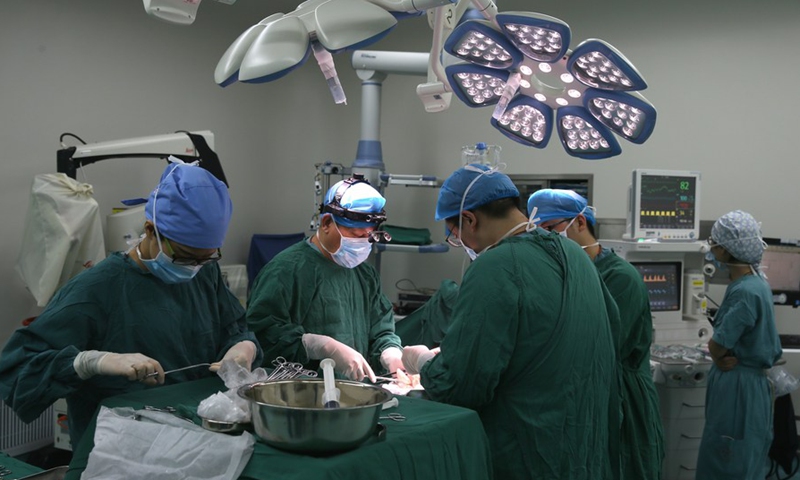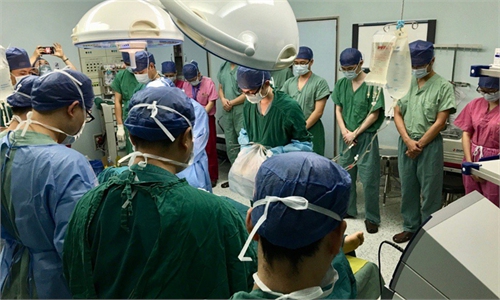China sees fast increase in registered organ donation volunteers, govt to amend organ transplant rules

Medical staff conduct a kidney transplantation surgery for an organ recipient in Hefei, capital of east China's Anhui Province, Aug. 22, 2018.Photo:Xinhua
As the Chinese government announced on Friday the amendment of organ transplantation regulations in the 2021 legislation plan, China's fast-forwarding organ transplantation development will see a further boost, said a top organ transplantation expert.
Statistics shows that the number of organ donation volunteers at a national foundation has increased by over 45 percent since the beginning of the COVID-19 epidemic.
More than 1.77 million people have been registered as an organ donation volunteer as of Friday at China Organ Transportation Development Foundation (COTDF), an institute supported by China's National Health Commission to promote voluntary organ donation and equitable organ distribution in the country.
The number shows an increase of about 46.5 percent compared with the number at the end of 2019, despite the impact of the epidemic, according to a report released by COTDF at a Friday conference held in Yan'an, Northwest China's Shaanxi Province.
It is also 100 times higher than at the beginning of 2015, when citizens' voluntary organ donation after death officially became the only legal channel for organ transplantation in China.
Among all registered organ donation volunteers at the foundation, 54 percent were born in the 1990s and 7 percent were born in the 2000s. The provinces with the most volunteers are South China's Guangdong Province, Southwest China's Sichuan Province, Central China's Henan Province and East China's Shandong Province.
With the increasing number of registered volunteers, the number of organ donations has also seen a generally upward trend within the last decade.
From 2015 to 2020, a total of 29,334 organs were successfully donated by Chinese citizens after death, according to the report.
The annual volume of organ donation in 2020 was 5,222, nearly 600 cases lower than in 2019. Huang Jiefu, head of the China National Organ Donation and Transplantation Committee and chairman of the foundation, explained at the conference that the decline resulted from the influence of the epidemic and some institutional reforms in the country.
Despite the rapid development of organ donation in China, a serious shortage of organs still exists due to the large number of patients in the country and the high demand for organ transplantation, Huang told the Global Times on Friday.
There are about 300,000 patients in China every year who suffer from terminal organ failure and need transplants, but only one of every 15 people has the opportunity to receive organ transplants, he said.
"Some patients cannot afford the transplantation, and meanwhile we still lack hospitals and doctors capable of carrying out transplantation operations," he said, noting China has 173 qualified medical institutions, but the goal should be 300.
However, the former deputy health minister said that the country's future development of organ donation and transportation is still promising, especially after the State Council announced on Friday that the amendment of China's organ transplantation regulations was included in the legislation plan of 2021.
"The beginning is simple, but the end is huge," Huang told the Global Times in English, saying that the government has demonstrated firm determination in making the reform.
The National Health Commission carried out a two-year special campaign from October 2020 to October 2022 to renovate and improve the organ donation and transplantation work in China.
The health administration, the Red Cross and the medical institutions need to join hands and act as one, he said, noting that this way will enable China to become the world's largest organ transplantation country in the next few years.


